#but this is the first time I've seen someone deny the existence of mental health clinics
Text
Saw a big ace positivity post on Twitter and there was one aphobe in the replies who was like "if mental health institutions existed you'd all be in there 🤷🏻♀️" and I rolled my eyes and was ready to scroll on and then I stopped like wait wdym if mental health institutions existed??? What in the conspiracy is this????
#i've seen people who denied the holocaust#and covid#and even allergies#and addictions#but this is the first time I've seen someone deny the existence of mental health clinics#what do you mean those aren't real??? every major hospital has one??#tw: aphobia#aphobia
168 notes
·
View notes
Text
In the latest chapter of my insane life, I'm in Oregon and not dead because of a band I found on TikTok.
I pretty much summed it up in a video I have pinned on my TikTok but basically I was getting burnt out in Chicago of having men scream at me and threaten me daily for just existing, my license was going to expire with no address to keep it, I got a bogus ticket with passengers in the car who said I did nothing wrong, and I said fuck it and left Chicago to off myself.
But I ended up getting into a shelter back home but that was going to be limited to when my car's registration expires. And after 2 HUD denials among another avalanche of shit falling down on me like it did in Chicago, I took off for Oregon.
But here's how it went...
Even back in Chicago I was still trying to process things I still can't fully process, and the idea was to try to find some reason to live, something to help my mental health, and I had the idea to try to just get back to me, who I was before life started really shitting on me and kicking me when I'm down all the time. That's when I bought the guitar (again) in 2021. But as things got worse, just having a guitar again wasn't enough. But I had still made up my mind to be a goth until the day I die and not ass kiss or people please or try to appease anyone anymore.
But I got deeply depressed in the shelter in Morgantown even though I was grateful to have a place to stay and shower daily. But I was horribly depressed, felt I'd never get anywhere, I'd never get HUD, my time was limited to my car's registration, the discrimination laws had passed in WV to where evryone from HUD to a Walmart employee could deny you service.
But during this time there were several people on TikTok that just watching them helped a little. All musicians and bands and one who just sings. At least I had those lives to look forward to seeing late at night.
But then I came across Fangbanger on a live playing in their garage. I thought they looked interesting enough to watch. I liked the energy. The comments were funny. People kinda make fun of them in the comments but the funniest was someone said Löded Diper. Haha. Sorry can't help that made me laugh. But I thought they were cool and I liked the music.
Their name stuck in my head though. I told someone about having seen them on live and that person told me it's a term from True Blood for people who fuck vampires and I said that's exactly what it sounded like to me - vampire fucker. Hah.
Then I saw them on live a 2nd time where they had mentioned what their band name was before and I couldn't remember what it was when I looked them up on YouTube to hear their stuff again. But I really liked it. Vertigo was my first favorite and something I could relate to. Things were just going downhill. Something I've already been crucified and slandered horribly over. But there were like 2 weeks of just being yelled at and shit on by someone I truly loved and like always, I try to hang onto things for dear life, I couldn't let go. I never wanted to let go. I never thought shit would end up this way.
Then I saw Fangbanger on again where I got it this time, to look up their stuff under The Faint Endless. And my 2nd favorite became Disappear. Which was about the time that was the real beginning of the end. Being told that it's selfish, arrogant, prideful and conceited of me to love him and have the feelings that I do. So fuck that! I've never been so hurt in my life and I've been told since the 4th grade by -everyone- that I'm too ugly to love, have no business liking guys, that its wrong for me to want someone special in my life, and I make guys miserable just by looking at them, and all that fucking shit. So Disappear REALLY fit the moment. Then came the shit storm online. And the 2nd HUd denial. And the choose between your car or the shelter. So I did disappear! I fucked off all the way to Oregon! Don't fuck with me!!!!!
But I really fucking love Fangbanger! I've loved their music, their energy, there's just something I connect with. I've thought that they're like what I wanted to be when I was a teenager and always wanted to have a band that would be something goth-punk-goth. Like a dial with Fangbanger on one side and The Sisters of Mercy on the other, and you can turn that dial for just the right amount of moodiness or anger. Or something like that.
But meeting them was surreal. I've met Jamie (Twiztid) like 100 times over, I've had a million beautiful moments over 5 years that got flushed down the toilet, nuked, and shit all over again, but the moment I met them just felt unreal. It was great. I'm shy too. I saw Ven at a distance and didn't want to shout out "Fangbanger!" in case it wasn't any of them and some stranger just thinks I'm crazy. Lol But it was her and she called the rest of them over and it was just so wild! They're also the first people altogether that I've met off TikTok. And I can't believe I got to hang out with them! They were sooooo nice to me too! And they are cool af to see live. I don't think I have the words to say just how great they are all around, as a band and as people.
I attempted to tatt one of their logos on me today using the kit I haven't touched in 3 years. Low confidence with my skin being super weird. I hope there's at least a line I can trace over if/when I have to touch it up. Fingers crossed 🤞.
For real, I fuckin love Fangbanger, I can't say enough good things about them, and they really pulled me out of the depths of the darkness I was in and I'd have been found dead in my car in the woods of West Virginia if I hadn't had something to run towards. They're the fucking best.
❤️💙💜🤘❤️💙💜 P.S. 3rd favorite...finding their older stuff on SoundCloud... I was parked for the night at a rest stop here south of Portland and first time I heard Death in December I just fucking cried.








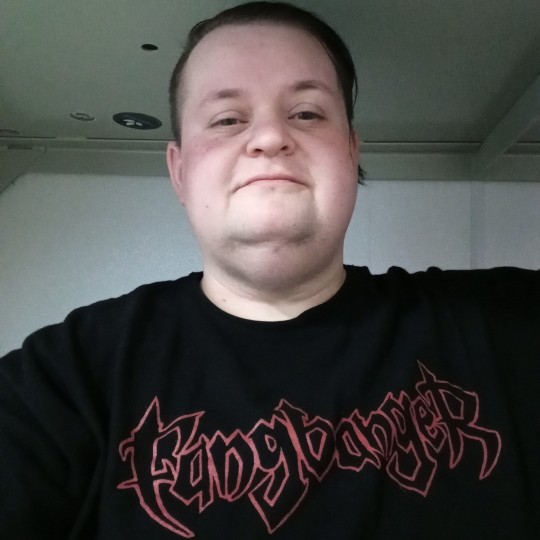

#homeless#homelessness#mental health#depressing shit#life stories#fangbanger#fangbanger band#crazy life
4 notes
·
View notes
Text
I keep going back over and over the conversation I had with my sister and I think I finally have a way to put what I was trying to say to her in a way that would make her understand I'm not trying to control her choices.
She kept telling me I was trying to control her. Which, is far from the truth.
I don't want to control what she does, think or say. She is free to be whoever she wants to be, think however she wants, etc.
What I was trying to say is, I have a boundary that I do not want to be around people who have a certain ideology.
I'm not telling her she can't think that way, I'm simply stating that for my own safety and my own mental health, I do not want to be around people who think that way.
She is free to believe that trans folk shouldn't exist. She is free to believe that god made people the way they are and that they shouldn't change that.
Just as I am free to make the choice not to surround myself with people who think like that.
As I do believe that everyone is made exactly as they were intended to be made, cis, trans, intersex, etc.
And to surround myself with people who tell me they support me, but also have the mentality that they believe that my 'life style' is a 'choice', would be mentally harmful to me.
Family or not, blood related or not, I don't want to around people who think like that, as I know that they only support my 'choice', support me, because I am family. And that rubs me the wrong way.
When you actively make efforts towards suppressing trans folk, but then look at me and say 'oh but not you'. That doesn't mean that my suppression is lessened in any way, as they are voting or donating their time and money to the active suppression of trans individuals, and thus me.
Because if trans rights are taken away, like in the state of Florida, it would/does effect me. I had to move out of Idaho, a state I had lived in for 20 years, because of the negative effects of trans suppression.
Simply slapping on the, 'but I support you' doesn't take the very real consequences that are happening because of their active support/belief in the anti-trans movement away.
While I know now how better to explain what I was trying to say, it doesn't change the fact that a relationship with her would never be possible.
I've grown up, and I've set hard boundaries for myself. Boundaries I had denied myself all my life because I was so brain washed into the 'family means everything' bs.
While my family now does truly and wholeheartedly mean everything to me, and by family I mean my wife and son. They are my chosen individuals. They are people in whom support me, love me and I can support and love them with no 'but's attached.
Now, if my son hits 18 and decides that for his own good that he wants to go no contact with me, I would first try to figure out why and see if we can't fix things and if not, then I would respect that. As he would be free to make those choices and if that was what was best for him, then I would be crushed and hurt and sad, but I would respect that because it would be what he feels is best for him.
I truly believe that having boundaries with people, family and all, is healthy and very much needed in today's world. But, I believe some people will just never be able to fully grasp or understand why a person would want to have boundaries even if that means giving up their families.
Now that I have spoken to my sister and have seen her reactions to my boundaries, I feel much better. I feel like a weight has been lifted off my shoulders. Because her reaction, though brought on by a place of hurt, was uncalled for and horribly rude and I'm much better off not having someone in my life who is going to do their best to try to hurt me simply because something I did well over three years ago hurt their feelings and they never even said anything about it until now.
Communication is just that. It's a place to talk things out and try to come to an understanding and if one can't be reached than you go your separate ways. It is not a place to berate, name call, and belittle someone simply because you are upset/hurt by something they have said or done. That is why you have the conversation. To air out your hurt and frustrations and say, hey this thing hurt me. And give the person a fair chance to explain their side.
Either way, what's done is done.
I've found my happy place, with my family and though I would like to expand that, I want to do so with individuals who will up lift us, not bring us down. And, it's finally time to let go of the past and look forward to our future.
Which my wife and I are working hard to make it the best one we can for ourselves and our son.
0 notes
Text
Roman and Mental Health
Ok, now we need to have a serious talk about mental health as this fandom from what I've seen takes it as a joke. Fics with Virgil being killed by anxiety meds, abuse fanfictions and suicidal/depression fictions. Don't get me wrong some of the fanfictions are great but some really are not accurate. I also completely understand about wanting to project onto your favourite characters but be careful when doing as the topics are really serious
I know im being a hypocrite and Aw back to mental health but my mental health struggles are similar to Roman, however, unlike him, I don't unhealthy bottle up and project.
I really want to talk about putting others first, Roman is at his breaking point and literally looks on the verge of a panic attack and like he's trying to hold it back so he doesn't break down. My headcanon is that Roman did have a panic attack after pof and nobody came to help.
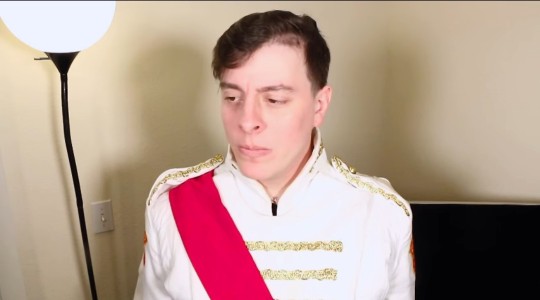
I just people really seem to be joking about Romans mental health and it annoys me. Sure the laughing hurt Janus but we don't know much about him and he seems to just want acceptance. Janus is no longer casted out by Thomas, anyway I will talk about my thoughts and theories about Janus another time. However fanders are saying Roman deserved it for laughing at Janus.
I will forever remember a lesson my mother has taught me. Two wrongs don't make a right. Saying Roman deserves to suffer and be alone is just really disrespectful, Roman has hurt the others but he tries to be better. Janus knows the sides secrets and insecurities he purposely bite back at Roman. Did Virgil decided to make Romans mental health worse when Roman thought his name sounded like Virgin. No, he didn't.
Roman has made mistakes of course he has he's human after all but that does not give you the right to wish a character to suffer or that he didn't exist at all. Low self-esteem is a mental health problem that shouldn't be made fun of my brother is depressed because of his low self-esteem.
Imagine if you met a real person like Roman and you said: "oh sorry you've bullied people all your life you deserve to suffer." How you preserve fictional characters can drastically reflect how you treat other people.
Romans mental health has begun to tumble since he decided to deny his purpose to make Patton happy. The Prince before he had a name had problems in the first episode he was on a battle to same himself. But episode after episode like Logan his mental health has tumbled to the point where he breaks down when someone asks for there opinion.
Roman and Janus should have been alot nicer each other, Thomas knows about mental health and what he's doing with his characters.
If you met a Roman-like character would you really be that horrible. Or are you ignoring his mental health struggles because he's a fictional character.
P.s despite this page being dedicated to my favourite Prince. I will be covering Patton as he has had the same amount of toxic treatment. Also, don't respond if you hate Roman im just trying to raise awareness of the problems of the fandom as they rarely get highlighted.
Thank you for coming to my mental health awareness talk.
Tagged:
@misconceivedcapricorn @romansanders @royalprinceroman @romanocheesy @roman-appreciation-central @roman-sanders-appreciation-blog @creativitwins-central @sandersidess @pwinceyroman @princemesscharming @prince-romansanders @permenantly-screaming @princeromannn-blog1 @sanderssides @patton-cake @proship-roman-positivity
#sander sides#roman angst#ts roman#roman sanders#roman sanders angst#mental health awareness#fandom criticism#fandom negativity#no hate#janus negativity#janus criticism
177 notes
·
View notes
Note
I loved the dream life reading for namjoon, I know this overlaps a bit with the life after fame reading, but can you do one (or something related) for yoongi as well? I've only seen money-focused readings on him so I wonder if he has any other future goals or will he just lock himself in his studio forever lol
good question. so, what does yoongi’s dream life currently look like:
the spread
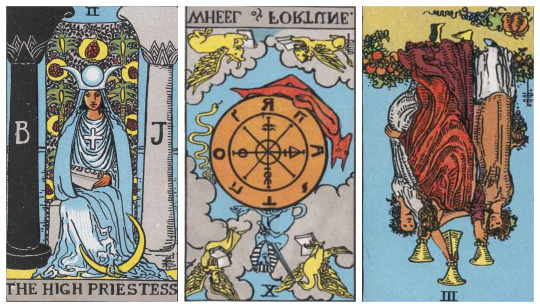
⎡THE HIGH PRIESTESS⎦Every Tarot reader wants this card as a description of themselves. Because it speaks of a lot of spiritual gifts and insights. In Yoongi’s case, we can interpret it in a similar way. His dream life is being a very elusive character. He enjoys having secret admirers. Nowhere near him, nobody gets into his business, but yes, he’s wanted dead or alive. Mostly alive, in his sexiest form. Being a creative genius, old soul, and master producer is very much on his list. That love at a distance is how he feels the most comfortable and safe. He wants his art and unattainable position to accompany him for a long time. As a second component to the card beside wanting others to yearn for the mysterious Min, Yoongi also seeks to find a higher power. Nothing more, nothing less. His goal is to uncover the secret to life, even if the answer is something very vague. Except maybe ideas of Judaism and Christianity — see the Tora and Cross on the card — he’s not going to pursue hardcore religion, otherwise we’d have the conformity-loving HIEROPHANT (aka the pope). This is about more metaphysical and philosophical questions rather than joining an organized collective. He wants to immerse himself in study and emerge deeply knowing. Only to disappear in the veil once again to learn about existence. Lots of questions on his mind, and he wants to know the right way to live. Priest Louis Williams Suga Adams the 3rd, you know the deal.
⎡THE WHEEL OF FORTUNE (reverse)⎦Yoongi wants to embrace disorder in his life. Schedules throw his inner clock off balance and feel like a hassle to him. Also, in his usual manner, he wants struggle and challenges to bring him off track so he has something to focus on. Yoongi without strife and unexpected hardships is like a sports car without gas. He’d be jobless! The everlasting motto for Yoongi will remain: No pain, no fucking gain. He doesn’t want things to go smoothly, it’d be an unrealistic and undemanding way to him. His mind is already set to it like a radar. He mistrusts good luck and wants more hustle and obstacles. Every normal human being would run for the hills, but he needs blockages to tear down. This is very much rapper mentality, you can tell why he’s in that profession. Yoongi needs adversity, otherwise his lyrics will read... nothing at all, blank slate. On the one hand, he will grow strong, wise, and prepared like that, on the other, he will exhaust himself. But that’s precisely what his idea of paradise will look like, and he needs a good reason to relax. In short: Yoongi wants lightning to strike his life in half every now and then, and play with Goddess Fortuna.
⎡THREE OF CUPS (reverse)⎦First, he plans to give up his wine drinking habit. It’s his escape from stress and social anxiety, once the stress is no longer there, the alcohol, too, will fade. He knows he drinks out of negative reasons and not positive ones, he will ditch the bottle down the line responsibly toward his health. And then: Yes, Yoongi does not plan to widen his social circle. Family-wise, romance-wise, friend-wise, colleague-wise. Once he has the chance to build his own life, he won’t party, he won’t go out to bars, he won’t host something at his home. Sweet serenity and silence is what he is wired to. Yoongi isn’t forcing himself into being alone or does it to hurt others by withdrawing. It’s the way he naturally is and feels he benefits society the most. His Pisces needs are best met when he’s behind the curtain and outside of that dang 2020s chaos. And in this current time and with his level of fame, that’s only feasible to him by not inviting anybody at all, and not starting things that will only disappoint others. No weddings or reunions from back in the day, Yoongi looks for his own company and authenticity. He won’t coerce anything or deny when he grows apart form someone. Yoongi’s dolce vita is cancelling everything fake that’s thrown his way blissfully. Cue Ne-Yo: He’s got his own thing, that’s why I love him, Mister Independent. In short, yes, he wants to live like a cat.
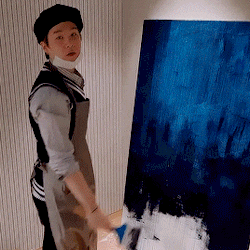
65 notes
·
View notes
Note
The racism of Canada, once you manage to spot it through the maple-syrup coated denial, has a very 'there is no war in Ba Sing Se' character to it. People will deny left and right that racism in Canada, if it exists at all *wink wink* is just "not as bad as that of America". The number of white Canadians I've met who came to this conclusion because they personally haven't witnessed racism is nothing short of astounding. They either don't realize or are in denial that it happens a lot behind 1/?
Closed doors. And because it mostly takes place behind closed doors, there are always other excuses for racist acts to be found in abundance: the 'it's just business, they have a right to fire inadequate employees' excuse, the 'nobody understands the way they speak' excuse, the 'we can't just let people stop working to pray ten times a day, nothing will get done' excuse... And when someone DOES witness overt racism, they assume it's a fluke, a one-off, not something that happens a lot
They NEVER ask the people on the receiving end of racism if this happens a lot. NEVER. It's mindboggling at times, how badly people are invested in it not 'being as bad as America'. And depending on where in Canada you live, different groups of people are on the receiving end of the racism: in the province of British Columbia, Asians tend to get a lot of flack since immigrants from various Asian countries get in through there and are often labeled 'chinese', regardless of their real origin
In the eastern part of the country, especially in Quebec and Ontario, Muslims are often the targets of racism, especially after 9/11. Honor killings are the usual excuse provided to imply that Muslim=middle Eastern=uncivilized, with one particular incident of it that happened years ago involving a conservative Muslim father killing his wife and two daughters 'because he didn't like western influence on them'. The case was widely publicized as a cautionary tale to women in particular to avoid
... anything middle Eastern to protect themselves from such violence. But in all of Canada, no group is more looked down on than the indigenous First Nations people. If America looks like it hates black people in particular, then Canada's biggest beef is with the First Nations. They are pitied, held in contempt and dismissed all at once everywhere here. They're perceived as drunkards, swindlers and too self absorbed in their own suffering to be able to 'improve their own situation' themselves
This is often used as an excuse to keep control of their land and financial power firmly in the hands of the federal government's agencies instead of letting them organize themselves, and they pay for it with appalling poverty, high mental health problems incidences and often violent clashes with police. I have reblogged some of the most obvious conflicts between indigenous peoples and the Canadian gov. before, so feel free to peruse my #canada tag if you want to get a decent sense of it
I would also recommend the blog @allthecanadianpolitics to get more info on various topics related to racism in Canada. They have reliable sources and post regularly, and have a much better tagging system than me. Hopefully this wasn't too long a read!
First, I would like to thank you for speaking your thoughts and helping me understand! It wasn’t a long read actually lol Tumblr’s character limit is a nuisance tbqh
I have heard.. or like have seen both sides of the argument of the ‘existence’ of racism. Obviously, I am not Canadian nor do I reside there so its often hard for me to ask without sounding ignorant or pick a side, of course, without fully understanding the situation. Haa.. America is always so .. full of something at any given moment. I had just hoped that America wouldn’t be really used as a baseline on which is acceptable for racism— no racism is the accept level of racism. I wish I can say something about Canadian racism (like.. the not believing its real because it hasnt happen to you is just bad lol) but I cannot
I’ll definitely check out your tag and that blog after work!
Also, thank you for allowing me to post this on my blog! I’m sure that I’m not the only ones with questions so I hope this helps those as well. Thank you!
12 notes
·
View notes
Text
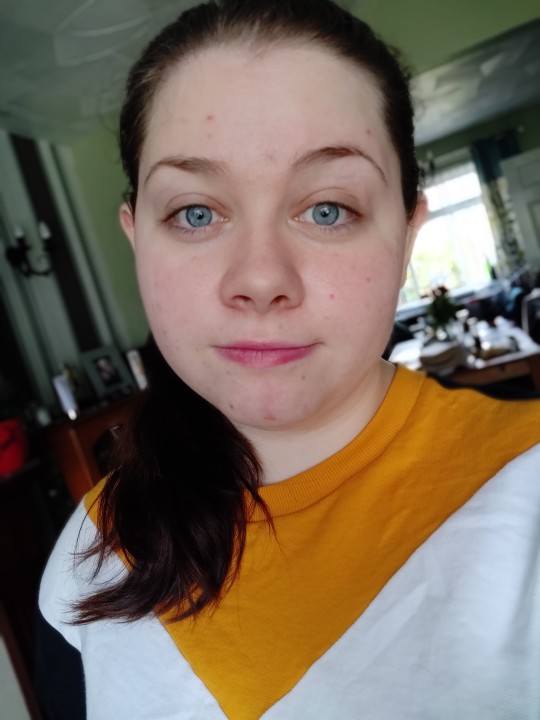
This isn't what I'd class as a 'normal' photo for me. I'm not wearing any makeup and my skin is far from perfect but this is probably the best it's been in 6 weeks. It's probably not a normal post either. I don't talk publicly about my mental health but I feel like today is a day where I can say I feel like crap. Those under eye bags are that of someone who hasn't slept a full night in a good number of weeks. But I really can't complain. In the last few weeks, I've probably spent more time with my parents than I have in the last 6 months. I have baked lots of cake (and subsequently eaten it). I passed my first exam at uni. I've handed in my last essay for my first year of uni. My hairdryer gave up yesterday but it's ok because I could go and order one online. I might not have learned a new skill, or taken up running, or been the greatest human being to ever exist but I've gotten out my bed every morning and done something. And for me that's enough and all my brain feels like doing. I feel like there's a lot of pressure for people to come out of all of this with 30 new skills and languages learned but I don't want to. I should be at work, in a hospital, learning. But I'm not, I'm at home, sitting on my couch, fighting my own brain. I've only had medication for my anxiety since the beginning of February and I'm fortunate enough that I don't need to take it all the time. In the last week though, I've had to take it just to sleep. But I have nothing to complain about. I'm lucky. I am currently living with 3 other people who are all struggling in their own way. Because everyone is struggling. There's no denying it. Humans aren't built to be unsociable creatures. Of all the things I'm missing whilst in lockdown, silly things like takeaways and shopping trips are pretty high up my list but even higher are my friends, my grandparents and my sister. I've seen them on video chats and I saw my sister when she stood at the end of my front garden and we talked, but couldn't hug. My one weakness is no hugging. So trust me when I say, I'll not have learned a new language or taken up running when this is all over. I'll be going and hugging a lot of people and getting back to work and trying to have some sense of normality back in my life. But for today, sitting on my couch will be enough.
If anyone wants to chat about anything or everything, I'm here. We can be enough for today.
0 notes
Note
I've just seen your post about mental health issues and how HWA impacted you. I just wanted to say that you are so incredibly brave for opening up like this, and I can't describe how important it is to me that I was able to help, even in small ways. I'm terribly sorry you have to deal with such a difficult situation, but yes, I'd just like to reinforce that there really isn't anything "weak" about admitting you need help. It's SUCH a hard step and you've made it, that's amazing. Thank you.
@dracze I just want to say first that I’m glad that you did read my post. I think it was important of me to acknowledge that I would not have come to this point without reading your story, and I felt it was important for you to know the impact you made as well.
In all honesty, me writing and posting what I did was kind of a way of locking myself into a verbal agreement with myself. I’m saying “You’ve done the hardest part, you’ve admitted that there is an issue and you’re not hiding that or denying it anymore. Now you need to do something about it like you said you would.”
I still don’t know why, but the truth is that yes, I do listen more to fictional characters than I do real people. I’ve had people in my life say the exact same thing that Leslie said to Bruce during that session, and yet somehow I never really felt I could believe them. But, reading that particular dialouge in this specific story, where I was already incredible emotionally invested in it, was eye opening. Hearing it in this context, I found it believable for once, and mainly because it was concerning Bruce that someone said that did I believe it.
The thing is, I have tried to acknowledge before that there were problems, multiple times. I did come to my parents before, after they told me repeatedly it was ok to do so, but because I had learned so well how to hide what I really felt behind a false facade to get myself through my days, they never believed me. They either told me my struggles weren’t that bad, or that I was faking it or just wanted attention. After so many times of hearing it, I kinda just said inwardly to myself that “Ok, you’re problems? They’re managable, if they even exist at all. You can do this, you don’t need a professional. Let’s just live life and do what you need to do and you’ll be fine. It’ll all go away on it’s own.”
And that, that is the biggest fucking lie I ever told myself. And the problem was, I believed it until very recently.
I had a day last week where I slept through all my classes. (I’m in my freshman year at uni.) Normally, if something like that happened, I would be an anxious guilty mess over missing the lecture and for now being behind everyone by a day.
Except that didn’t happen. I woke up after sleeping through the classes, and I felt absolutly nothing. My emotions were entirely blank. I did not give a single flying fuck. At all. I was basically numb.
And that?? That was the point where I said enough’s enough.
I am not properly able to take care of this on my own, and I never ever was. I let it get to this point for far too long, and it’s time I did something to fix it, because I cannot live like this anymore.
I don’t really consider myelf brave for doing this, more like it was nesessary. Because it was, and thats the bottom line of why I did it.
In any case, your story helped me immensely. I NEEDED to hear that dialouge. I absolutly needed that. And I’m glad I did hear it. Because now?
Now is where I take the steps into my own hands, and I march myself down to campus consulers and I make an appointment. And I will start down a (probably very long) road to fixing these issues.
(I know this was a lot to read. But this was also an important addition to that post as well.)
5 notes
·
View notes
Text
What I've learned about caring for my mental health since having a breakdown
What I've learned about caring for my mental health since having a breakdown

October 10th is World Mental Health Day.
You can't tell by looking at me, but three years ago, I had a complete breakdown-or an emotional health crisis. A lot has happened in the time since. I've taken a few steps forward, then twice the amount of steps back. I've been split apart and put back together. But most importantly, I'm still here, still navigating who I've become in the aftermath of something so earth-shattering, and still hoping to be seen.
If you've never witnessed, experienced, or heard of a mental health breakdown, it's an acute manifestation of an already lingering anxiety, depression, or bipolar disorder. The result is an inability to function in everyday life, feelings of hopelessness, and/or a feeling that you will never be “normal” again. It's an isolated state because you've either hidden the warning signs from loved ones, or denied them yourself. Even when managed, my anxiety and depression have me white-knuckling a cliff so as not to drop. If you know what panic feels like, then imagine a breakdown as a heightened version of that state-like trying to see through your car windshield while driving in a monsoon. That feeling doesn't let up until you've quite literally cracked up.
My experience, which happened after months of ignoring red flags, was a combination of stress, undiagnosed disorders wreaking havoc on my everyday life (specifically OCD and PTSD), occasional suicidal ideation, and the smallest of triggers (an argument that quickly went awry). In an instant, my panic inflated from 1 to 100. I couldn't breathe. I couldn't see past my rapid heartbeat. I not only felt like the room was collapsing in on me, but the whole world. This definitive moment-one so burned into my memory that I can recall an internal sound, like the heated sizzle of my short-circuiting brain wires-became the catalyst for why I split in two.
There was the me before this event, and the me after. The in-between no longer existed.
Immediately after, I was numb. I'd been protected by a shell until the shell splintered and disintegrated to nothing. Left to fend for myself (or so I felt at the time), I became catatonic, fueled only by tears and the belief that I could never be okay again. I still remember lying on the floor with my laptop in front of me, desperate to find the help I knew I so desperately needed. But, as I quickly found, mental health care is complicated.
Here are some things I learned throughout this incredibly raw time. I hope this information can help you if you ever find yourself in a similar situation:
1. You have to reach out, even if you don't feel like it.
At the time, I was blessed with an amazing support system at my job. They weren't only my friends or my coworkers, but my family. Even still, I hesitated telling them what had happened to me, for fear of judgment. I was embarrassed by something that I couldn't control.
When I finally sent the emails and texts explaining what I was recovering from, I felt a sense of relief by getting it off my chest and I was greeted with the exact love, support, and encouragement that I should've come to expect from these people. I will forever consider them my saviors for hearing me, seeing me, and reminding me that I am not alone in this world. If you don't have a support system, it's imperative that you talk to someone. Take advantage of counselors through accessible mental health resources. It could mean the difference between coming back from the brink or dropping from that aforementioned cliff.
Your mental health is important too #WorldMentalHealthDay pic.twitter.com/9Y2znMhm5P
- Action for Happiness (@actionhappiness) October 9, 2018
2. The path to recovery may be tedious.
Shortly after my breakdown, as I lay on the floor with my laptop while my husband desperately tried to understand, I searched for help. And I searched. And I searched. And I searched. Turns out, when you factor in insurance barriers, the fact that you are not feeling suicidal in that exact moment, and a doctor's track record for successful treatment, finding good health care is more difficult than it sounds. Most of the professionals who I wanted to see were completely booked with appointments that had already been set months in advance. and had room for emergencies only. I wasn't a threat to myself-just more dazed and lost than usual-and I told myself that those spots should be reserved for someone in far darker places than I felt at the time. But I still needed help.
Days later, I called a help line and an inpatient facility, and the reality of it all terrified me into hanging up. I believed I could figure it out on my own-however wrong that idea was. But I forced myself to keep searching for treatment because my life and emotional well-being was at stake. I am so glad I did, because I eventually found the right, available doctors for me.
No matter how much work it is, you have to keep searching.
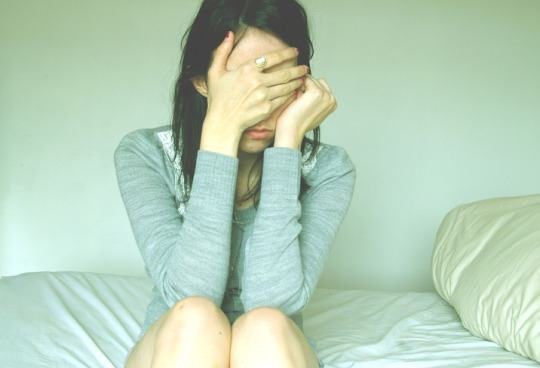
Leanne Surfleet/Getty Images
3. Go to the appointments and do the work, even when it gets exhausting.
At the beginning of my treatment, I went through three forms of therapy. I'm a believer in going big or going home, and this was the most important thing I've ever needed to go big for. One therapist specialized in cognitive behavioral therapy (CBT), where I learned tools for grounding myself in the present moment. CBT challenged me to stop grieving my past and to stop looking into the future so I could breathe in the present. I'm not going to lie; it's hard. I failed (still fail) often. It takes practice, and sometimes, I don't feel mentally fit to go through the motions. But when done properly, it works for me.
My second therapist helped me work through childhood traumas that were the long-standing cause of my breakdown. These sessions were emotionally draining and I often left exhausted after cleansing myself of all that plagued me. Seeing this therapist meant facing my demons head on. It was the most difficult thing I've ever done and, to be honest, I stopped going after my grandmother died. As my therapist herself warned, my grandma was the glue holding a lot of me together. Without her in my life, I didn't feel strong enough to continue such intensive therapy. That's what's so hard about these disorders: They lie, convincing you that you aren't strong enough. I know I am now.
The third form of therapy was group grief counseling to address my deepest wound-the loss of my biological father to cancer. As I sat, listening to others share their stories of loss, I began to understand that I truly wasn't alone. On some level, we all understand pain.

KatarzynaBialasiewicz/Getty Images
4. Practice continual self-care.
As the mother of two children with multiple jobs and to-do lists, I'm never not busy. That takes a toll. After the incident, I took a hard look at all I'd done to take care of myself despite whatever life demanded of me-a kind of inventory. Turns out, I'm the last person that I care for, often shorting myself in the event that someone else needs something first. I wasn't doing myself or my emotional health any favors by trying to please everyone all the time, holding my frustrations inside, and blaming myself for every upsetting moment in the history of life.
Today, we are highlighting the millions of strong and brave individuals who live with mental illness. Remember, your journey is worth sharing. #MIAW pic.twitter.com/DtIrFfcOME
- NAMI (@NAMICommunicate) October 9, 2018
5. Accept that caring for your mental health is an ongoing, imperfect journey.
Three years ago, I didn't know how to forgive myself for things beyond my control. I didn't know how to move on from my past or how to admit I'm a flawed human who sometimes needs more than she's willing to ask for (if she'll even ask at all). I still suffer from my disorders and I still have to work to manage them. But now, when all starts feeling lost again, I don't ignore the warning signs. I take precautionary measures like seeking support and health care, pouring myself into something that makes me happy, practicing self-care, and most of all, being patient with myself.
Mental health isn't a destination; it's a journey you'll be on for the rest of your life.
One bad day doesn't ruin them all. You will mess up. You will still cry. You will still battle the same emotions that brought you to your knees in the first place. In the three years since I've accepted my reality, I now understand things I couldn't in my “before.” I'm stronger than I give myself credit for, and if you see pieces of yourself in my story, then let me be the first to say that you are, too.
So, hold on, friend. You are seen.
If you are struggling and need help, call the National Alliance on Mental Illness HelpLine at 1-800-950-NAMI (6264), available Monday through Friday, 10 a.m.–6 p.m., ET. If this is an emergency, you can call the National Suicide Prevention Lifeline at 800-273-TALK (8255) or text NAMI's Crisis Line at 741-741.
The post What I've learned about caring for my mental health since having a breakdown appeared first on HelloGiggles.
0 notes
Text
What I've learned about caring for my mental health since having a breakdown
What I've learned about caring for my mental health since having a breakdown

October 10th is World Mental Health Day.
You can't tell by looking at me, but three years ago, I had a complete breakdown-or an emotional health crisis. A lot has happened in the time since. I've taken a few steps forward, then twice the amount of steps back. I've been split apart and put back together. But most importantly, I'm still here, still navigating who I've become in the aftermath of something so earth-shattering, and still hoping to be seen.
If you've never witnessed, experienced, or heard of a mental health breakdown, it's an acute manifestation of an already lingering anxiety, depression, or bipolar disorder. The result is an inability to function in everyday life, feelings of hopelessness, and/or a feeling that you will never be “normal” again. It's an isolated state because you've either hidden the warning signs from loved ones, or denied them yourself. Even when managed, my anxiety and depression have me white-knuckling a cliff so as not to drop. If you know what panic feels like, then imagine a breakdown as a heightened version of that state-like trying to see through your car windshield while driving in a monsoon. That feeling doesn't let up until you've quite literally cracked up.
My experience, which happened after months of ignoring red flags, was a combination of stress, undiagnosed disorders wreaking havoc on my everyday life (specifically OCD and PTSD), occasional suicidal ideation, and the smallest of triggers (an argument that quickly went awry). In an instant, my panic inflated from 1 to 100. I couldn't breathe. I couldn't see past my rapid heartbeat. I not only felt like the room was collapsing in on me, but the whole world. This definitive moment-one so burned into my memory that I can recall an internal sound, like the heated sizzle of my short-circuiting brain wires-became the catalyst for why I split in two.
There was the me before this event, and the me after. The in-between no longer existed.
Immediately after, I was numb. I'd been protected by a shell until the shell splintered and disintegrated to nothing. Left to fend for myself (or so I felt at the time), I became catatonic, fueled only by tears and the belief that I could never be okay again. I still remember lying on the floor with my laptop in front of me, desperate to find the help I knew I so desperately needed. But, as I quickly found, mental health care is complicated.
Here are some things I learned throughout this incredibly raw time. I hope this information can help you if you ever find yourself in a similar situation:
1. You have to reach out, even if you don't feel like it.
At the time, I was blessed with an amazing support system at my job. They weren't only my friends or my coworkers, but my family. Even still, I hesitated telling them what had happened to me, for fear of judgment. I was embarrassed by something that I couldn't control.
When I finally sent the emails and texts explaining what I was recovering from, I felt a sense of relief by getting it off my chest and I was greeted with the exact love, support, and encouragement that I should've come to expect from these people. I will forever consider them my saviors for hearing me, seeing me, and reminding me that I am not alone in this world. If you don't have a support system, it's imperative that you talk to someone. Take advantage of counselors through accessible mental health resources. It could mean the difference between coming back from the brink or dropping from that aforementioned cliff.
Your mental health is important too #WorldMentalHealthDay pic.twitter.com/9Y2znMhm5P
- Action for Happiness (@actionhappiness) October 9, 2018
2. The path to recovery may be tedious.
Shortly after my breakdown, as I lay on the floor with my laptop while my husband desperately tried to understand, I searched for help. And I searched. And I searched. And I searched. Turns out, when you factor in insurance barriers, the fact that you are not feeling suicidal in that exact moment, and a doctor's track record for successful treatment, finding good health care is more difficult than it sounds. Most of the professionals who I wanted to see were completely booked with appointments that had already been set months in advance. and had room for emergencies only. I wasn't a threat to myself-just more dazed and lost than usual-and I told myself that those spots should be reserved for someone in far darker places than I felt at the time. But I still needed help.
Days later, I called a help line and an inpatient facility, and the reality of it all terrified me into hanging up. I believed I could figure it out on my own-however wrong that idea was. But I forced myself to keep searching for treatment because my life and emotional well-being was at stake. I am so glad I did, because I eventually found the right, available doctors for me.
No matter how much work it is, you have to keep searching.

Leanne Surfleet/Getty Images
3. Go to the appointments and do the work, even when it gets exhausting.
At the beginning of my treatment, I went through three forms of therapy. I'm a believer in going big or going home, and this was the most important thing I've ever needed to go big for. One therapist specialized in cognitive behavioral therapy (CBT), where I learned tools for grounding myself in the present moment. CBT challenged me to stop grieving my past and to stop looking into the future so I could breathe in the present. I'm not going to lie; it's hard. I failed (still fail) often. It takes practice, and sometimes, I don't feel mentally fit to go through the motions. But when done properly, it works for me.
My second therapist helped me work through childhood traumas that were the long-standing cause of my breakdown. These sessions were emotionally draining and I often left exhausted after cleansing myself of all that plagued me. Seeing this therapist meant facing my demons head on. It was the most difficult thing I've ever done and, to be honest, I stopped going after my grandmother died. As my therapist herself warned, my grandma was the glue holding a lot of me together. Without her in my life, I didn't feel strong enough to continue such intensive therapy. That's what's so hard about these disorders: They lie, convincing you that you aren't strong enough. I know I am now.
The third form of therapy was group grief counseling to address my deepest wound-the loss of my biological father to cancer. As I sat, listening to others share their stories of loss, I began to understand that I truly wasn't alone. On some level, we all understand pain.

KatarzynaBialasiewicz/Getty Images
4. Practice continual self-care.
As the mother of two children with multiple jobs and to-do lists, I'm never not busy. That takes a toll. After the incident, I took a hard look at all I'd done to take care of myself despite whatever life demanded of me-a kind of inventory. Turns out, I'm the last person that I care for, often shorting myself in the event that someone else needs something first. I wasn't doing myself or my emotional health any favors by trying to please everyone all the time, holding my frustrations inside, and blaming myself for every upsetting moment in the history of life.
Today, we are highlighting the millions of strong and brave individuals who live with mental illness. Remember, your journey is worth sharing. #MIAW pic.twitter.com/DtIrFfcOME
- NAMI (@NAMICommunicate) October 9, 2018
5. Accept that caring for your mental health is an ongoing, imperfect journey.
Three years ago, I didn't know how to forgive myself for things beyond my control. I didn't know how to move on from my past or how to admit I'm a flawed human who sometimes needs more than she's willing to ask for (if she'll even ask at all). I still suffer from my disorders and I still have to work to manage them. But now, when all starts feeling lost again, I don't ignore the warning signs. I take precautionary measures like seeking support and health care, pouring myself into something that makes me happy, practicing self-care, and most of all, being patient with myself.
Mental health isn't a destination; it's a journey you'll be on for the rest of your life.
One bad day doesn't ruin them all. You will mess up. You will still cry. You will still battle the same emotions that brought you to your knees in the first place. In the three years since I've accepted my reality, I now understand things I couldn't in my “before.” I'm stronger than I give myself credit for, and if you see pieces of yourself in my story, then let me be the first to say that you are, too.
So, hold on, friend. You are seen.
If you are struggling and need help, call the National Alliance on Mental Illness HelpLine at 1-800-950-NAMI (6264), available Monday through Friday, 10 a.m.–6 p.m., ET. If this is an emergency, you can call the National Suicide Prevention Lifeline at 800-273-TALK (8255) or text NAMI's Crisis Line at 741-741.
The post What I've learned about caring for my mental health since having a breakdown appeared first on HelloGiggles.
0 notes
Text
What I've learned about caring for my mental health since having a breakdown
What I've learned about caring for my mental health since having a breakdown

October 10th is World Mental Health Day.
You can't tell by looking at me, but three years ago, I had a complete breakdown-or an emotional health crisis. A lot has happened in the time since. I've taken a few steps forward, then twice the amount of steps back. I've been split apart and put back together. But most importantly, I'm still here, still navigating who I've become in the aftermath of something so earth-shattering, and still hoping to be seen.
If you've never witnessed, experienced, or heard of a mental health breakdown, it's an acute manifestation of an already lingering anxiety, depression, or bipolar disorder. The result is an inability to function in everyday life, feelings of hopelessness, and/or a feeling that you will never be “normal” again. It's an isolated state because you've either hidden the warning signs from loved ones, or denied them yourself. Even when managed, my anxiety and depression have me white-knuckling a cliff so as not to drop. If you know what panic feels like, then imagine a breakdown as a heightened version of that state-like trying to see through your car windshield while driving in a monsoon. That feeling doesn't let up until you've quite literally cracked up.
My experience, which happened after months of ignoring red flags, was a combination of stress, undiagnosed disorders wreaking havoc on my everyday life (specifically OCD and PTSD), occasional suicidal ideation, and the smallest of triggers (an argument that quickly went awry). In an instant, my panic inflated from 1 to 100. I couldn't breathe. I couldn't see past my rapid heartbeat. I not only felt like the room was collapsing in on me, but the whole world. This definitive moment-one so burned into my memory that I can recall an internal sound, like the heated sizzle of my short-circuiting brain wires-became the catalyst for why I split in two.
There was the me before this event, and the me after. The in-between no longer existed.
Immediately after, I was numb. I'd been protected by a shell until the shell splintered and disintegrated to nothing. Left to fend for myself (or so I felt at the time), I became catatonic, fueled only by tears and the belief that I could never be okay again. I still remember lying on the floor with my laptop in front of me, desperate to find the help I knew I so desperately needed. But, as I quickly found, mental health care is complicated.
Here are some things I learned throughout this incredibly raw time. I hope this information can help you if you ever find yourself in a similar situation:
1. You have to reach out, even if you don't feel like it.
At the time, I was blessed with an amazing support system at my job. They weren't only my friends or my coworkers, but my family. Even still, I hesitated telling them what had happened to me, for fear of judgment. I was embarrassed by something that I couldn't control.
When I finally sent the emails and texts explaining what I was recovering from, I felt a sense of relief by getting it off my chest and I was greeted with the exact love, support, and encouragement that I should've come to expect from these people. I will forever consider them my saviors for hearing me, seeing me, and reminding me that I am not alone in this world. If you don't have a support system, it's imperative that you talk to someone. Take advantage of counselors through accessible mental health resources. It could mean the difference between coming back from the brink or dropping from that aforementioned cliff.
Your mental health is important too #WorldMentalHealthDay pic.twitter.com/9Y2znMhm5P
- Action for Happiness (@actionhappiness) October 9, 2018
2. The path to recovery may be tedious.
Shortly after my breakdown, as I lay on the floor with my laptop while my husband desperately tried to understand, I searched for help. And I searched. And I searched. And I searched. Turns out, when you factor in insurance barriers, the fact that you are not feeling suicidal in that exact moment, and a doctor's track record for successful treatment, finding good health care is more difficult than it sounds. Most of the professionals who I wanted to see were completely booked with appointments that had already been set months in advance. and had room for emergencies only. I wasn't a threat to myself-just more dazed and lost than usual-and I told myself that those spots should be reserved for someone in far darker places than I felt at the time. But I still needed help.
Days later, I called a help line and an inpatient facility, and the reality of it all terrified me into hanging up. I believed I could figure it out on my own-however wrong that idea was. But I forced myself to keep searching for treatment because my life and emotional well-being was at stake. I am so glad I did, because I eventually found the right, available doctors for me.
No matter how much work it is, you have to keep searching.
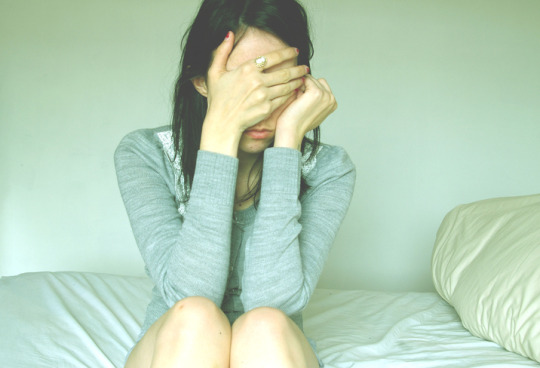
Leanne Surfleet/Getty Images
3. Go to the appointments and do the work, even when it gets exhausting.
At the beginning of my treatment, I went through three forms of therapy. I'm a believer in going big or going home, and this was the most important thing I've ever needed to go big for. One therapist specialized in cognitive behavioral therapy (CBT), where I learned tools for grounding myself in the present moment. CBT challenged me to stop grieving my past and to stop looking into the future so I could breathe in the present. I'm not going to lie; it's hard. I failed (still fail) often. It takes practice, and sometimes, I don't feel mentally fit to go through the motions. But when done properly, it works for me.
My second therapist helped me work through childhood traumas that were the long-standing cause of my breakdown. These sessions were emotionally draining and I often left exhausted after cleansing myself of all that plagued me. Seeing this therapist meant facing my demons head on. It was the most difficult thing I've ever done and, to be honest, I stopped going after my grandmother died. As my therapist herself warned, my grandma was the glue holding a lot of me together. Without her in my life, I didn't feel strong enough to continue such intensive therapy. That's what's so hard about these disorders: They lie, convincing you that you aren't strong enough. I know I am now.
The third form of therapy was group grief counseling to address my deepest wound-the loss of my biological father to cancer. As I sat, listening to others share their stories of loss, I began to understand that I truly wasn't alone. On some level, we all understand pain.

KatarzynaBialasiewicz/Getty Images
4. Practice continual self-care.
As the mother of two children with multiple jobs and to-do lists, I'm never not busy. That takes a toll. After the incident, I took a hard look at all I'd done to take care of myself despite whatever life demanded of me-a kind of inventory. Turns out, I'm the last person that I care for, often shorting myself in the event that someone else needs something first. I wasn't doing myself or my emotional health any favors by trying to please everyone all the time, holding my frustrations inside, and blaming myself for every upsetting moment in the history of life.
Today, we are highlighting the millions of strong and brave individuals who live with mental illness. Remember, your journey is worth sharing. #MIAW pic.twitter.com/DtIrFfcOME
- NAMI (@NAMICommunicate) October 9, 2018
5. Accept that caring for your mental health is an ongoing, imperfect journey.
Three years ago, I didn't know how to forgive myself for things beyond my control. I didn't know how to move on from my past or how to admit I'm a flawed human who sometimes needs more than she's willing to ask for (if she'll even ask at all). I still suffer from my disorders and I still have to work to manage them. But now, when all starts feeling lost again, I don't ignore the warning signs. I take precautionary measures like seeking support and health care, pouring myself into something that makes me happy, practicing self-care, and most of all, being patient with myself.
Mental health isn't a destination; it's a journey you'll be on for the rest of your life.
One bad day doesn't ruin them all. You will mess up. You will still cry. You will still battle the same emotions that brought you to your knees in the first place. In the three years since I've accepted my reality, I now understand things I couldn't in my “before.” I'm stronger than I give myself credit for, and if you see pieces of yourself in my story, then let me be the first to say that you are, too.
So, hold on, friend. You are seen.
If you are struggling and need help, call the National Alliance on Mental Illness HelpLine at 1-800-950-NAMI (6264), available Monday through Friday, 10 a.m.–6 p.m., ET. If this is an emergency, you can call the National Suicide Prevention Lifeline at 800-273-TALK (8255) or text NAMI's Crisis Line at 741-741.
The post What I've learned about caring for my mental health since having a breakdown appeared first on HelloGiggles.
0 notes
Text
What I've learned about caring for my mental health since having a breakdown
What I've learned about caring for my mental health since having a breakdown

October 10th is World Mental Health Day.
You can't tell by looking at me, but three years ago, I had a complete breakdown-or an emotional health crisis. A lot has happened in the time since. I've taken a few steps forward, then twice the amount of steps back. I've been split apart and put back together. But most importantly, I'm still here, still navigating who I've become in the aftermath of something so earth-shattering, and still hoping to be seen.
If you've never witnessed, experienced, or heard of a mental health breakdown, it's an acute manifestation of an already lingering anxiety, depression, or bipolar disorder. The result is an inability to function in everyday life, feelings of hopelessness, and/or a feeling that you will never be “normal” again. It's an isolated state because you've either hidden the warning signs from loved ones, or denied them yourself. Even when managed, my anxiety and depression have me white-knuckling a cliff so as not to drop. If you know what panic feels like, then imagine a breakdown as a heightened version of that state-like trying to see through your car windshield while driving in a monsoon. That feeling doesn't let up until you've quite literally cracked up.
My experience, which happened after months of ignoring red flags, was a combination of stress, undiagnosed disorders wreaking havoc on my everyday life (specifically OCD and PTSD), occasional suicidal ideation, and the smallest of triggers (an argument that quickly went awry). In an instant, my panic inflated from 1 to 100. I couldn't breathe. I couldn't see past my rapid heartbeat. I not only felt like the room was collapsing in on me, but the whole world. This definitive moment-one so burned into my memory that I can recall an internal sound, like the heated sizzle of my short-circuiting brain wires-became the catalyst for why I split in two.
There was the me before this event, and the me after. The in-between no longer existed.
Immediately after, I was numb. I'd been protected by a shell until the shell splintered and disintegrated to nothing. Left to fend for myself (or so I felt at the time), I became catatonic, fueled only by tears and the belief that I could never be okay again. I still remember lying on the floor with my laptop in front of me, desperate to find the help I knew I so desperately needed. But, as I quickly found, mental health care is complicated.
Here are some things I learned throughout this incredibly raw time. I hope this information can help you if you ever find yourself in a similar situation:
1. You have to reach out, even if you don't feel like it.
At the time, I was blessed with an amazing support system at my job. They weren't only my friends or my coworkers, but my family. Even still, I hesitated telling them what had happened to me, for fear of judgment. I was embarrassed by something that I couldn't control.
When I finally sent the emails and texts explaining what I was recovering from, I felt a sense of relief by getting it off my chest and I was greeted with the exact love, support, and encouragement that I should've come to expect from these people. I will forever consider them my saviors for hearing me, seeing me, and reminding me that I am not alone in this world. If you don't have a support system, it's imperative that you talk to someone. Take advantage of counselors through accessible mental health resources. It could mean the difference between coming back from the brink or dropping from that aforementioned cliff.
Your mental health is important too #WorldMentalHealthDay pic.twitter.com/9Y2znMhm5P
- Action for Happiness (@actionhappiness) October 9, 2018
2. The path to recovery may be tedious.
Shortly after my breakdown, as I lay on the floor with my laptop while my husband desperately tried to understand, I searched for help. And I searched. And I searched. And I searched. Turns out, when you factor in insurance barriers, the fact that you are not feeling suicidal in that exact moment, and a doctor's track record for successful treatment, finding good health care is more difficult than it sounds. Most of the professionals who I wanted to see were completely booked with appointments that had already been set months in advance. and had room for emergencies only. I wasn't a threat to myself-just more dazed and lost than usual-and I told myself that those spots should be reserved for someone in far darker places than I felt at the time. But I still needed help.
Days later, I called a help line and an inpatient facility, and the reality of it all terrified me into hanging up. I believed I could figure it out on my own-however wrong that idea was. But I forced myself to keep searching for treatment because my life and emotional well-being was at stake. I am so glad I did, because I eventually found the right, available doctors for me.
No matter how much work it is, you have to keep searching.

Leanne Surfleet/Getty Images
3. Go to the appointments and do the work, even when it gets exhausting.
At the beginning of my treatment, I went through three forms of therapy. I'm a believer in going big or going home, and this was the most important thing I've ever needed to go big for. One therapist specialized in cognitive behavioral therapy (CBT), where I learned tools for grounding myself in the present moment. CBT challenged me to stop grieving my past and to stop looking into the future so I could breathe in the present. I'm not going to lie; it's hard. I failed (still fail) often. It takes practice, and sometimes, I don't feel mentally fit to go through the motions. But when done properly, it works for me.
My second therapist helped me work through childhood traumas that were the long-standing cause of my breakdown. These sessions were emotionally draining and I often left exhausted after cleansing myself of all that plagued me. Seeing this therapist meant facing my demons head on. It was the most difficult thing I've ever done and, to be honest, I stopped going after my grandmother died. As my therapist herself warned, my grandma was the glue holding a lot of me together. Without her in my life, I didn't feel strong enough to continue such intensive therapy. That's what's so hard about these disorders: They lie, convincing you that you aren't strong enough. I know I am now.
The third form of therapy was group grief counseling to address my deepest wound-the loss of my biological father to cancer. As I sat, listening to others share their stories of loss, I began to understand that I truly wasn't alone. On some level, we all understand pain.

KatarzynaBialasiewicz/Getty Images
4. Practice continual self-care.
As the mother of two children with multiple jobs and to-do lists, I'm never not busy. That takes a toll. After the incident, I took a hard look at all I'd done to take care of myself despite whatever life demanded of me-a kind of inventory. Turns out, I'm the last person that I care for, often shorting myself in the event that someone else needs something first. I wasn't doing myself or my emotional health any favors by trying to please everyone all the time, holding my frustrations inside, and blaming myself for every upsetting moment in the history of life.
Today, we are highlighting the millions of strong and brave individuals who live with mental illness. Remember, your journey is worth sharing. #MIAW pic.twitter.com/DtIrFfcOME
- NAMI (@NAMICommunicate) October 9, 2018
5. Accept that caring for your mental health is an ongoing, imperfect journey.
Three years ago, I didn't know how to forgive myself for things beyond my control. I didn't know how to move on from my past or how to admit I'm a flawed human who sometimes needs more than she's willing to ask for (if she'll even ask at all). I still suffer from my disorders and I still have to work to manage them. But now, when all starts feeling lost again, I don't ignore the warning signs. I take precautionary measures like seeking support and health care, pouring myself into something that makes me happy, practicing self-care, and most of all, being patient with myself.
Mental health isn't a destination; it's a journey you'll be on for the rest of your life.
One bad day doesn't ruin them all. You will mess up. You will still cry. You will still battle the same emotions that brought you to your knees in the first place. In the three years since I've accepted my reality, I now understand things I couldn't in my “before.” I'm stronger than I give myself credit for, and if you see pieces of yourself in my story, then let me be the first to say that you are, too.
So, hold on, friend. You are seen.
If you are struggling and need help, call the National Alliance on Mental Illness HelpLine at 1-800-950-NAMI (6264), available Monday through Friday, 10 a.m.–6 p.m., ET. If this is an emergency, you can call the National Suicide Prevention Lifeline at 800-273-TALK (8255) or text NAMI's Crisis Line at 741-741.
The post What I've learned about caring for my mental health since having a breakdown appeared first on HelloGiggles.
0 notes
Text
What I've learned about caring for my mental health since having a breakdown
What I've learned about caring for my mental health since having a breakdown

October 10th is World Mental Health Day.
You can't tell by looking at me, but three years ago, I had a complete breakdown-or an emotional health crisis. A lot has happened in the time since. I've taken a few steps forward, then twice the amount of steps back. I've been split apart and put back together. But most importantly, I'm still here, still navigating who I've become in the aftermath of something so earth-shattering, and still hoping to be seen.
If you've never witnessed, experienced, or heard of a mental health breakdown, it's an acute manifestation of an already lingering anxiety, depression, or bipolar disorder. The result is an inability to function in everyday life, feelings of hopelessness, and/or a feeling that you will never be “normal” again. It's an isolated state because you've either hidden the warning signs from loved ones, or denied them yourself. Even when managed, my anxiety and depression have me white-knuckling a cliff so as not to drop. If you know what panic feels like, then imagine a breakdown as a heightened version of that state-like trying to see through your car windshield while driving in a monsoon. That feeling doesn't let up until you've quite literally cracked up.
My experience, which happened after months of ignoring red flags, was a combination of stress, undiagnosed disorders wreaking havoc on my everyday life (specifically OCD and PTSD), occasional suicidal ideation, and the smallest of triggers (an argument that quickly went awry). In an instant, my panic inflated from 1 to 100. I couldn't breathe. I couldn't see past my rapid heartbeat. I not only felt like the room was collapsing in on me, but the whole world. This definitive moment-one so burned into my memory that I can recall an internal sound, like the heated sizzle of my short-circuiting brain wires-became the catalyst for why I split in two.
There was the me before this event, and the me after. The in-between no longer existed.
Immediately after, I was numb. I'd been protected by a shell until the shell splintered and disintegrated to nothing. Left to fend for myself (or so I felt at the time), I became catatonic, fueled only by tears and the belief that I could never be okay again. I still remember lying on the floor with my laptop in front of me, desperate to find the help I knew I so desperately needed. But, as I quickly found, mental health care is complicated.
Here are some things I learned throughout this incredibly raw time. I hope this information can help you if you ever find yourself in a similar situation:
1. You have to reach out, even if you don't feel like it.
At the time, I was blessed with an amazing support system at my job. They weren't only my friends or my coworkers, but my family. Even still, I hesitated telling them what had happened to me, for fear of judgment. I was embarrassed by something that I couldn't control.
When I finally sent the emails and texts explaining what I was recovering from, I felt a sense of relief by getting it off my chest and I was greeted with the exact love, support, and encouragement that I should've come to expect from these people. I will forever consider them my saviors for hearing me, seeing me, and reminding me that I am not alone in this world. If you don't have a support system, it's imperative that you talk to someone. Take advantage of counselors through accessible mental health resources. It could mean the difference between coming back from the brink or dropping from that aforementioned cliff.
Your mental health is important too #WorldMentalHealthDay pic.twitter.com/9Y2znMhm5P
- Action for Happiness (@actionhappiness) October 9, 2018
2. The path to recovery may be tedious.
Shortly after my breakdown, as I lay on the floor with my laptop while my husband desperately tried to understand, I searched for help. And I searched. And I searched. And I searched. Turns out, when you factor in insurance barriers, the fact that you are not feeling suicidal in that exact moment, and a doctor's track record for successful treatment, finding good health care is more difficult than it sounds. Most of the professionals who I wanted to see were completely booked with appointments that had already been set months in advance. and had room for emergencies only. I wasn't a threat to myself-just more dazed and lost than usual-and I told myself that those spots should be reserved for someone in far darker places than I felt at the time. But I still needed help.
Days later, I called a help line and an inpatient facility, and the reality of it all terrified me into hanging up. I believed I could figure it out on my own-however wrong that idea was. But I forced myself to keep searching for treatment because my life and emotional well-being was at stake. I am so glad I did, because I eventually found the right, available doctors for me.
No matter how much work it is, you have to keep searching.

Leanne Surfleet/Getty Images
3. Go to the appointments and do the work, even when it gets exhausting.
At the beginning of my treatment, I went through three forms of therapy. I'm a believer in going big or going home, and this was the most important thing I've ever needed to go big for. One therapist specialized in cognitive behavioral therapy (CBT), where I learned tools for grounding myself in the present moment. CBT challenged me to stop grieving my past and to stop looking into the future so I could breathe in the present. I'm not going to lie; it's hard. I failed (still fail) often. It takes practice, and sometimes, I don't feel mentally fit to go through the motions. But when done properly, it works for me.
My second therapist helped me work through childhood traumas that were the long-standing cause of my breakdown. These sessions were emotionally draining and I often left exhausted after cleansing myself of all that plagued me. Seeing this therapist meant facing my demons head on. It was the most difficult thing I've ever done and, to be honest, I stopped going after my grandmother died. As my therapist herself warned, my grandma was the glue holding a lot of me together. Without her in my life, I didn't feel strong enough to continue such intensive therapy. That's what's so hard about these disorders: They lie, convincing you that you aren't strong enough. I know I am now.
The third form of therapy was group grief counseling to address my deepest wound-the loss of my biological father to cancer. As I sat, listening to others share their stories of loss, I began to understand that I truly wasn't alone. On some level, we all understand pain.

KatarzynaBialasiewicz/Getty Images
4. Practice continual self-care.
As the mother of two children with multiple jobs and to-do lists, I'm never not busy. That takes a toll. After the incident, I took a hard look at all I'd done to take care of myself despite whatever life demanded of me-a kind of inventory. Turns out, I'm the last person that I care for, often shorting myself in the event that someone else needs something first. I wasn't doing myself or my emotional health any favors by trying to please everyone all the time, holding my frustrations inside, and blaming myself for every upsetting moment in the history of life.
Today, we are highlighting the millions of strong and brave individuals who live with mental illness. Remember, your journey is worth sharing. #MIAW pic.twitter.com/DtIrFfcOME
- NAMI (@NAMICommunicate) October 9, 2018
5. Accept that caring for your mental health is an ongoing, imperfect journey.
Three years ago, I didn't know how to forgive myself for things beyond my control. I didn't know how to move on from my past or how to admit I'm a flawed human who sometimes needs more than she's willing to ask for (if she'll even ask at all). I still suffer from my disorders and I still have to work to manage them. But now, when all starts feeling lost again, I don't ignore the warning signs. I take precautionary measures like seeking support and health care, pouring myself into something that makes me happy, practicing self-care, and most of all, being patient with myself.
Mental health isn't a destination; it's a journey you'll be on for the rest of your life.
One bad day doesn't ruin them all. You will mess up. You will still cry. You will still battle the same emotions that brought you to your knees in the first place. In the three years since I've accepted my reality, I now understand things I couldn't in my “before.” I'm stronger than I give myself credit for, and if you see pieces of yourself in my story, then let me be the first to say that you are, too.
So, hold on, friend. You are seen.
If you are struggling and need help, call the National Alliance on Mental Illness HelpLine at 1-800-950-NAMI (6264), available Monday through Friday, 10 a.m.–6 p.m., ET. If this is an emergency, you can call the National Suicide Prevention Lifeline at 800-273-TALK (8255) or text NAMI's Crisis Line at 741-741.
The post What I've learned about caring for my mental health since having a breakdown appeared first on HelloGiggles.
0 notes
Text
What I've learned about caring for my mental health since having a breakdown
What I've learned about caring for my mental health since having a breakdown

October 10th is World Mental Health Day.
You can't tell by looking at me, but three years ago, I had a complete breakdown-or an emotional health crisis. A lot has happened in the time since. I've taken a few steps forward, then twice the amount of steps back. I've been split apart and put back together. But most importantly, I'm still here, still navigating who I've become in the aftermath of something so earth-shattering, and still hoping to be seen.
If you've never witnessed, experienced, or heard of a mental health breakdown, it's an acute manifestation of an already lingering anxiety, depression, or bipolar disorder. The result is an inability to function in everyday life, feelings of hopelessness, and/or a feeling that you will never be “normal” again. It's an isolated state because you've either hidden the warning signs from loved ones, or denied them yourself. Even when managed, my anxiety and depression have me white-knuckling a cliff so as not to drop. If you know what panic feels like, then imagine a breakdown as a heightened version of that state-like trying to see through your car windshield while driving in a monsoon. That feeling doesn't let up until you've quite literally cracked up.
My experience, which happened after months of ignoring red flags, was a combination of stress, undiagnosed disorders wreaking havoc on my everyday life (specifically OCD and PTSD), occasional suicidal ideation, and the smallest of triggers (an argument that quickly went awry). In an instant, my panic inflated from 1 to 100. I couldn't breathe. I couldn't see past my rapid heartbeat. I not only felt like the room was collapsing in on me, but the whole world. This definitive moment-one so burned into my memory that I can recall an internal sound, like the heated sizzle of my short-circuiting brain wires-became the catalyst for why I split in two.
There was the me before this event, and the me after. The in-between no longer existed.
Immediately after, I was numb. I'd been protected by a shell until the shell splintered and disintegrated to nothing. Left to fend for myself (or so I felt at the time), I became catatonic, fueled only by tears and the belief that I could never be okay again. I still remember lying on the floor with my laptop in front of me, desperate to find the help I knew I so desperately needed. But, as I quickly found, mental health care is complicated.
Here are some things I learned throughout this incredibly raw time. I hope this information can help you if you ever find yourself in a similar situation:
1. You have to reach out, even if you don't feel like it.
At the time, I was blessed with an amazing support system at my job. They weren't only my friends or my coworkers, but my family. Even still, I hesitated telling them what had happened to me, for fear of judgment. I was embarrassed by something that I couldn't control.
When I finally sent the emails and texts explaining what I was recovering from, I felt a sense of relief by getting it off my chest and I was greeted with the exact love, support, and encouragement that I should've come to expect from these people. I will forever consider them my saviors for hearing me, seeing me, and reminding me that I am not alone in this world. If you don't have a support system, it's imperative that you talk to someone. Take advantage of counselors through accessible mental health resources. It could mean the difference between coming back from the brink or dropping from that aforementioned cliff.
Your mental health is important too #WorldMentalHealthDay pic.twitter.com/9Y2znMhm5P
- Action for Happiness (@actionhappiness) October 9, 2018
2. The path to recovery may be tedious.
Shortly after my breakdown, as I lay on the floor with my laptop while my husband desperately tried to understand, I searched for help. And I searched. And I searched. And I searched. Turns out, when you factor in insurance barriers, the fact that you are not feeling suicidal in that exact moment, and a doctor's track record for successful treatment, finding good health care is more difficult than it sounds. Most of the professionals who I wanted to see were completely booked with appointments that had already been set months in advance. and had room for emergencies only. I wasn't a threat to myself-just more dazed and lost than usual-and I told myself that those spots should be reserved for someone in far darker places than I felt at the time. But I still needed help.
Days later, I called a help line and an inpatient facility, and the reality of it all terrified me into hanging up. I believed I could figure it out on my own-however wrong that idea was. But I forced myself to keep searching for treatment because my life and emotional well-being was at stake. I am so glad I did, because I eventually found the right, available doctors for me.
No matter how much work it is, you have to keep searching.

Leanne Surfleet/Getty Images
3. Go to the appointments and do the work, even when it gets exhausting.
At the beginning of my treatment, I went through three forms of therapy. I'm a believer in going big or going home, and this was the most important thing I've ever needed to go big for. One therapist specialized in cognitive behavioral therapy (CBT), where I learned tools for grounding myself in the present moment. CBT challenged me to stop grieving my past and to stop looking into the future so I could breathe in the present. I'm not going to lie; it's hard. I failed (still fail) often. It takes practice, and sometimes, I don't feel mentally fit to go through the motions. But when done properly, it works for me.
My second therapist helped me work through childhood traumas that were the long-standing cause of my breakdown. These sessions were emotionally draining and I often left exhausted after cleansing myself of all that plagued me. Seeing this therapist meant facing my demons head on. It was the most difficult thing I've ever done and, to be honest, I stopped going after my grandmother died. As my therapist herself warned, my grandma was the glue holding a lot of me together. Without her in my life, I didn't feel strong enough to continue such intensive therapy. That's what's so hard about these disorders: They lie, convincing you that you aren't strong enough. I know I am now.
The third form of therapy was group grief counseling to address my deepest wound-the loss of my biological father to cancer. As I sat, listening to others share their stories of loss, I began to understand that I truly wasn't alone. On some level, we all understand pain.

KatarzynaBialasiewicz/Getty Images
4. Practice continual self-care.
As the mother of two children with multiple jobs and to-do lists, I'm never not busy. That takes a toll. After the incident, I took a hard look at all I'd done to take care of myself despite whatever life demanded of me-a kind of inventory. Turns out, I'm the last person that I care for, often shorting myself in the event that someone else needs something first. I wasn't doing myself or my emotional health any favors by trying to please everyone all the time, holding my frustrations inside, and blaming myself for every upsetting moment in the history of life.
Today, we are highlighting the millions of strong and brave individuals who live with mental illness. Remember, your journey is worth sharing. #MIAW pic.twitter.com/DtIrFfcOME
- NAMI (@NAMICommunicate) October 9, 2018
5. Accept that caring for your mental health is an ongoing, imperfect journey.
Three years ago, I didn't know how to forgive myself for things beyond my control. I didn't know how to move on from my past or how to admit I'm a flawed human who sometimes needs more than she's willing to ask for (if she'll even ask at all). I still suffer from my disorders and I still have to work to manage them. But now, when all starts feeling lost again, I don't ignore the warning signs. I take precautionary measures like seeking support and health care, pouring myself into something that makes me happy, practicing self-care, and most of all, being patient with myself.
Mental health isn't a destination; it's a journey you'll be on for the rest of your life.
One bad day doesn't ruin them all. You will mess up. You will still cry. You will still battle the same emotions that brought you to your knees in the first place. In the three years since I've accepted my reality, I now understand things I couldn't in my “before.” I'm stronger than I give myself credit for, and if you see pieces of yourself in my story, then let me be the first to say that you are, too.
So, hold on, friend. You are seen.
If you are struggling and need help, call the National Alliance on Mental Illness HelpLine at 1-800-950-NAMI (6264), available Monday through Friday, 10 a.m.–6 p.m., ET. If this is an emergency, you can call the National Suicide Prevention Lifeline at 800-273-TALK (8255) or text NAMI's Crisis Line at 741-741.
The post What I've learned about caring for my mental health since having a breakdown appeared first on HelloGiggles.
0 notes